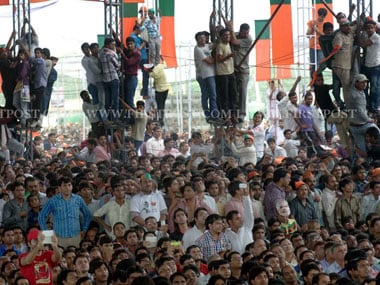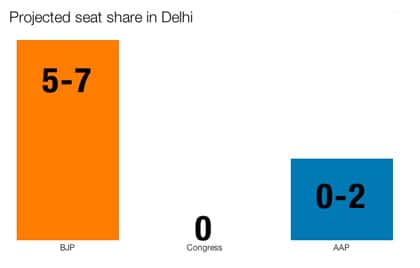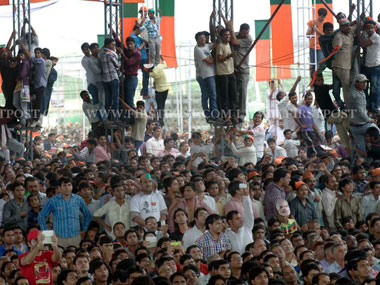With only 7 Lok Sabha seats, Delhi does not play a major role in the formation of a future government, but nonetheless, it has been one of the most keenly watched states this election. Apart from the fact that it is the national capital, Delhi is interesting this election, given the fact that the Congress (which won all 7 seats there in 2009) is set for a defeat at the hands of the BJP and new kids on the block, AAP. [caption id=“attachment_1141379” align=“alignleft” width=“380”]
 A section of the massive crowds that turned up to see Modi in Delhi: Naresh Sharma/Firstpost[/caption] Of course, the fact that AAP received its mercurial start to politics in the Delhi assembly elections just makes the mix all the more intriguing. It won 28 seats to the BJP’s 31, denying the latter of the necessary numbers to form the next government. In terms of voteshare, it won 30 percent of the vote, while the BJP won 33 percent. However in this game, it is the BJP that has come out tops, beating even pre-poll estimates, at least in terms of vote share. The biggest news out of Delhi: AAP is projected to get anywhere between 0-2 seats. In other words, they may come out in the end with nothing, not one seat to their name.
A section of the massive crowds that turned up to see Modi in Delhi: Naresh Sharma/Firstpost[/caption] Of course, the fact that AAP received its mercurial start to politics in the Delhi assembly elections just makes the mix all the more intriguing. It won 28 seats to the BJP’s 31, denying the latter of the necessary numbers to form the next government. In terms of voteshare, it won 30 percent of the vote, while the BJP won 33 percent. However in this game, it is the BJP that has come out tops, beating even pre-poll estimates, at least in terms of vote share. The biggest news out of Delhi: AAP is projected to get anywhere between 0-2 seats. In other words, they may come out in the end with nothing, not one seat to their name.
 The post poll results indicate that the BJP is set to win 45 percent of the vote, a clear 14 percentage points ahead of AAP, and a drastic improvement from its performance in the state assembly polls. The fact that Congress would perform badly was a foregone conclusion. A prepoll survey by CSDS-Lokniti estimated that the party would only be able to win around 22 percent of the total voteshare. However the post poll results project an even worse result – Congress is set to win just 7 percent of the voteshare. Contrast this with its performance in 2009, and you have a very sorry story indeed. The real story here however, is the BJP performance and the fact that it has left even AAP in the dust, One possible reason for clear leap ahead is the fact that the Delhi voter is looking at a national picture and not a state level one. Pre poll surveys that came out ahead of even the Delhi assembly elections, indicated that while most people wanted an AAP led local government, they were in favour of a BJP led national government. However, as much as the AAP would have liked to believe otherwise, the fact that the party chose to resign from government in just 49 days has also hurt them in the city that first gave them a vote of confidence. According to the CSDS-Lokniti survey, more than 60 percent of those polled, said they believed that by resigning from the Delhi government in just 49 days, Arvind Kejriwal betrayed the supporters of the Aam Aadmi Party. Kejriwal always knew that this would be an issue, which was why, at almost every campaign rally, he would keep coming back to the issue and trying to justify his decision to resign from government. In a campaign report last month, Firstpost editor Sandip Roy visited a Kejriwal rally and
noted
, “It seems Kejriwal still has to keep explaining himself even to the party faithful spending most of his speech focusing on those 49 days in the past instead of the future (other than doomsday warning of spiraling mehengai under BJP or Congress). Even the decision to contest from Varanasi against Modi, was according to Firstpost editor R Jagannathan, a betrayal of the Delhi voter. Writing after the results of an ABP Nielsen poll in March
he noted
, “It is entirely understandable that the Delhi voter is miffed with Kejriwal. After hoisting him on their shoulders, the man hasn’t spoken a word about what he plans to do for her in case he returns to power after the next assembly elections. After he quit, the assembly has been in suspended animation. While Kejriwal is busy questioning Modi on whether he will desert Varanasi or Vadodara and why the latter is fighting from two seats, the irony has not hit home: he is, after all, a Delhi MLA, and is contesting the Varanasi Lok Sabha seat. Maybe he should tell the Delhi voter what he will do if he wins Varanasi, since he is claiming he will win there, too against Modi. Another reason for the results however, is definitely the Modi wave. The survey notes that 33 percent of the people who said they voted for BJP, intimated that they only did so because Narendra Modi was projected as the PM candidate. This, coming from Delhi, which was more divided than most states at least in terms of viable government choices, likely signals that despite Congress and other party’s protestations to the contrary, the Modi wave is real.
The post poll results indicate that the BJP is set to win 45 percent of the vote, a clear 14 percentage points ahead of AAP, and a drastic improvement from its performance in the state assembly polls. The fact that Congress would perform badly was a foregone conclusion. A prepoll survey by CSDS-Lokniti estimated that the party would only be able to win around 22 percent of the total voteshare. However the post poll results project an even worse result – Congress is set to win just 7 percent of the voteshare. Contrast this with its performance in 2009, and you have a very sorry story indeed. The real story here however, is the BJP performance and the fact that it has left even AAP in the dust, One possible reason for clear leap ahead is the fact that the Delhi voter is looking at a national picture and not a state level one. Pre poll surveys that came out ahead of even the Delhi assembly elections, indicated that while most people wanted an AAP led local government, they were in favour of a BJP led national government. However, as much as the AAP would have liked to believe otherwise, the fact that the party chose to resign from government in just 49 days has also hurt them in the city that first gave them a vote of confidence. According to the CSDS-Lokniti survey, more than 60 percent of those polled, said they believed that by resigning from the Delhi government in just 49 days, Arvind Kejriwal betrayed the supporters of the Aam Aadmi Party. Kejriwal always knew that this would be an issue, which was why, at almost every campaign rally, he would keep coming back to the issue and trying to justify his decision to resign from government. In a campaign report last month, Firstpost editor Sandip Roy visited a Kejriwal rally and
noted
, “It seems Kejriwal still has to keep explaining himself even to the party faithful spending most of his speech focusing on those 49 days in the past instead of the future (other than doomsday warning of spiraling mehengai under BJP or Congress). Even the decision to contest from Varanasi against Modi, was according to Firstpost editor R Jagannathan, a betrayal of the Delhi voter. Writing after the results of an ABP Nielsen poll in March
he noted
, “It is entirely understandable that the Delhi voter is miffed with Kejriwal. After hoisting him on their shoulders, the man hasn’t spoken a word about what he plans to do for her in case he returns to power after the next assembly elections. After he quit, the assembly has been in suspended animation. While Kejriwal is busy questioning Modi on whether he will desert Varanasi or Vadodara and why the latter is fighting from two seats, the irony has not hit home: he is, after all, a Delhi MLA, and is contesting the Varanasi Lok Sabha seat. Maybe he should tell the Delhi voter what he will do if he wins Varanasi, since he is claiming he will win there, too against Modi. Another reason for the results however, is definitely the Modi wave. The survey notes that 33 percent of the people who said they voted for BJP, intimated that they only did so because Narendra Modi was projected as the PM candidate. This, coming from Delhi, which was more divided than most states at least in terms of viable government choices, likely signals that despite Congress and other party’s protestations to the contrary, the Modi wave is real.
Exit polls 2014: Modi wave drowns AAP effect in Delhi
Ayeshea Perera
• May 12, 2014, 20:20:19 IST
With only 7 Lok Sabha seats, Delhi does not play a major role in the formation of a future government, but nonetheless, it has been one of the most keenly watched states this election.
Advertisement
)
End of Article